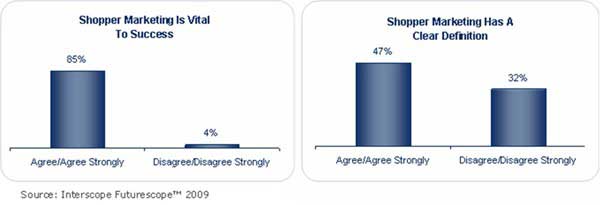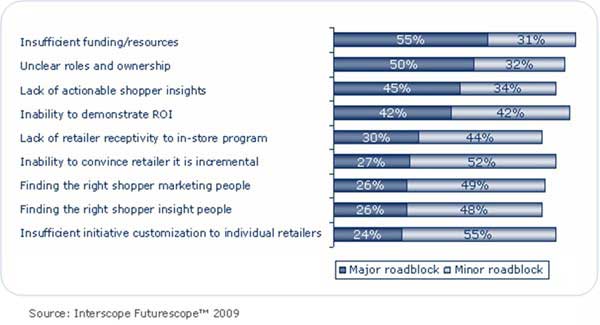In today's consumer-goods industry, manufacturers and retailers alike are recognizing the value of developing an integrated understanding of the consumer and the shopper. Combining voice of the shopper into brand and category plans is rapidly becoming a cost of entry for successful trading relationships.
Yet despite broad industry consensus on the need for shopper marketing, most organizations are still in the formative stage of developing the capability. Sound familiar?
With that in mind, we at Interscope focused on shopper marketing as the subject of Futurescope, our annual industry survey, now in its fourth year as a tool for benchmarking industry hot topics such as the future of category management and shopper insights.
Three-hundred people from some 150 companies completed the survey, providing a robust view of the state of shopper marketing today.
The Commitment Is Established
The industry clearly views shopper marketing as vital to success, yet less than half of respondents has a clear definition and vision of shopper marketing; moreover, respondents defined shopper-marketing activities in various ways.
Most respondents agreed on the basic in-store elements, such as shelf signage, promotion, and loyalty-card programs, that constitute shopper marketing; but, surprisingly, only one-third of respondents described the fundamentals, such as assortment and shelving, as part of the mix.

The lack of a clear definition and vision is likely a result of the newness of the discipline. Most organizations have established the shopper-marketing function, but it's still relatively new for most; It's viewed as a cross-functional discipline, but there is little consistency as to where it fits organizationally.
Clearly, shopper marketing programs are in development, with most manufacturers walking before they run. The survey found program development is focused on retailers willing to execute behind big ideas, share data, and act on category recommendations.
Most manufacturers in the survey said they had the right insights into shopper profiles, purchase drivers, and the category story, but the limitations placed on access to retailer data, such as store traffic and profitability, limits the ability to measure return on investment (ROI).
Going forward, it will be the strategic, senior-level partnerships that will succeed in executing innovative shopping experiences.
Why Is Shopper Marketing So Hard?
Most organizations struggle with implementing shopper marketing because of the following three hurdles:
- Integrating shopper marketing into the organization
- Allocating adequate funding and resources
- Measuring ROI.

Organization integration is viewed as highly challenging from both a structural and a procedural perspective: 55% agreed that fitting shopper marketing into the current organizational structure is difficult, and only 27% said shopper marketing is adequately integrated into the annual planning process.
The issue does not seem to be a matter of political turf issue but one of roles and responsibilities: 72% agreed that "it is not always clear who owns what in-store tactics."
The second key hurdle—allocating adequate resources—was clear: Only 28% said shopper marketing budgets are sufficient.
Typically, the marketing departments are the gatekeepers of funds, but most companies are still allocating only 10% or less of total spending to shopper marketing. That was particularly true in smaller organizations, whereas the industry leaders "get it" and some of them are allocating 25% or more to in-store activities.
The third key challenge is measuring ROI. In the data-rich environment that the industry is accustomed to, little is known about the impact of shopper-marketing ROI. Several significant approaches have been developed, only to be hindered by cost and timing considerations.
What Can Be Done?
To overcome those challenges and hurdles, Interscope has identified four critical steps to implement shopper marketing successfully:
- Start at the top. The lack of clear shopper-marketing vision and organization integration are largely a matter of leadership. Senior sales and marketing leadership must demonstrate a game-changer mindset and establish internal owners and teams to make shopper marketing happen. Make sure you develop a case for action and clear strategies, and define success metrics.
- Build integrated insights. Complete a comprehensive insights assessment and evaluation of what you know about the consumer, the shopper, the store, and the category. Those insights should be integrated into one category-based story. You need to create a plan to fill gaps and prioritize future insights needs.
- Ready the team. Enroll the organization to make shopper marketing an integrated and valued organization capability. That goes beyond a title designation, so you may need to reevaluate your internal structure and staffing. Critically evaluate current skill sets and be ready to change process, technology, and data needs significantly to achieve success.
- Activate creative solutions. Many shopper-marketing initiatives derail because organizations have a tendency to start with this step before setting the vision and mission. Successful activation is based on identifying common platforms that are a win for both the category and the brand. You must understand not only your own 3- 5-year strategy but also the strategies of your trading partners. You need to find ways to make the store an integral element of achieving them.



